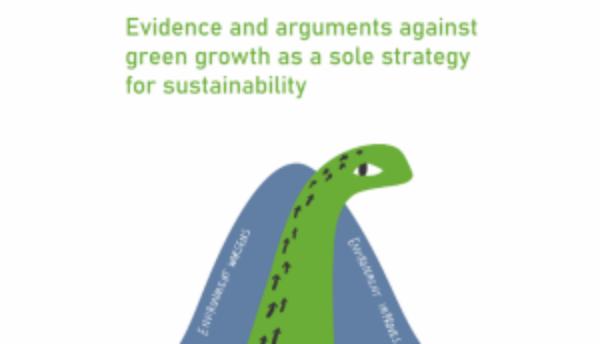The way to achieve decoupling is simple
And that is why it’s hard to take it.

I just discovered a report,published in July 2019 by the European Environmental Bureau (EEB), which presents itself as “the largest network of environmental citizens’ organisations in Europe”. The report discusses “evidence and arguments against green growth as a sole strategy for sustainability”. The main points are directly relevant to the goals of this website, so here they are.
Key question: Is it possible to enjoy both economic growth and environmental sustainability?
Short, unsurprising answer: No way.
Longer answer: Farewell to Green Growth
The conclusions of the report are that “Decoupling has been the main sustainability plan, at least for the OECD and the European Commission, since 2001… Considering the last two decades as a trial period, one must confront the fact that decoupling has failed to deliver the ecological sustainability it promised”.
Why decoupling is not working (but is still needed)
The report describes that it came to those conclusions because:
- no empirical evidence supports the existence of a decoupling of economic growth from environmental pressures on anywhere near the scale needed to deal with environmental breakdown
- such decoupling appears unlikely to happen in the future
- above all:
- decoupling on its own, i.e. without addressing the issue of economic growth, will not be sufficient to reduce environmental pressures to the required extent
- still, without implementing many measures proposed to achieve decoupling, the situation would be far worse
The report cites seven reasons for this situation. The four closer to the focus of this blog, that is meaningful digital innovation and appropriate digital technologies, are:
-
Problem shifting. Example: private electric cars (instead of smart pods) that require huge quantities of lithium, copper, cobalt and other (highly polluting) raw materials… to reduce pollution.
-
The underestimated impact of services, which often adds to, rather than substitute, that of goods. Digital music, for example, is far from being “immaterial”: “in terms of greenhouse gases, [digital] music is more polluting than it has ever been: from 140 million kg in 1977 to 157 in 2000 and between 200 and 350 in 2016”.
-
Limited potential of recycling. Recycling is intrinsically “strictly limited in its ability to provide resources for an expanding material economy”. We should push for repair much more than for recycling, something that is evidently against growth of GDP.
-
Insufficient and inappropriate technological change. We need toilets 2.0 and a reboot of public transit much more than we need the myriad of IoT gadgets, stress-inducing apps and “Uber-for-X” platforms that have already transformed Big Tech into Big Banks.
The way to go is simple. And just because of that, it’s hard to take it.
Who writes this, why, and how to help
I am Marco Fioretti, tech writer and aspiring polymath doing human-digital research and popularization.
I do it because YOUR civil rights and the quality of YOUR life depend every year more on how software is used AROUND you.
To this end, I have already shared more than a million words on this blog, without any paywall or user tracking, and am sharing the next million through a newsletter, also without any paywall.
The more direct support I get, the more I can continue to inform for free parents, teachers, decision makers, and everybody else who should know more stuff like this. You can support me with paid subscriptions to my newsletter, donations via PayPal (mfioretti@nexaima.net) or LiberaPay, or in any of the other ways listed here.THANKS for your support!